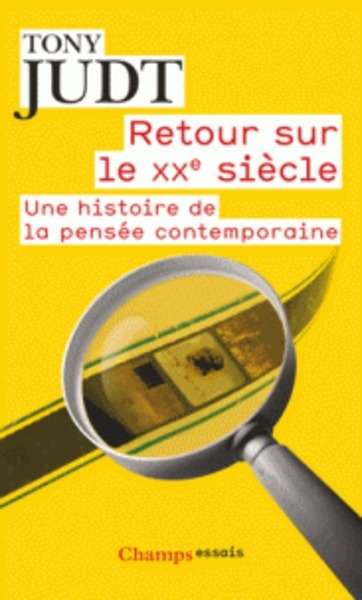Retour sur le XXe siècle
Une histoire de la pensée contemporaine

Editorial Libres champs
Fecha de edición octubre 2012 · Edición nº 1
Idioma español
EAN 9782081284470
647 páginas
Libro
Resumen del libro
Cet ouvrage réunit les articles de Tony Judt parus de 1994 à 2006 dans The New Republic et The New York Review of Books. Tony Judt aborde les principaux événements de l'histoire contemporaine et convoque les grandes figures intellectuelles du XXe siècle (Arthur Koestler, Primo Levi, Hannah Arendt, Albert Camus...). Deux lignes de force se dégagent de ses textes : le rôle des idées et la responsabilité des intellectuels dans l'histoire, et la difficulté que nous avons à dégager un sens et à tirer des leçons du siècle dernier.
"Nous sommes aujourd'hui prédisposés à voir dans le XXe siècle une ère d'extrêmes politiques, d'erreurs tragiques et de choix malencontreux ; une ère d'illusions dont nous serions aujourd'hui sortis. Mais ne nous abusons-nous pas ? Avec notre nouveau culte du secteur privé et du marché, n'avons nous pas purement et simplement inversé la foi d'une génération antérieure dans la "propriété publique" et "l'Etat" ou la "planification" ?"
Biografía del autor
x{0026}lt;P x{0026}lt;B Tony Judt x{0026}lt;/B (Londres, 1948-Nueva York, 2010) realizó sus estudios en el King's College de Cambridge y en la École Normale Supérieure de París. Impartió clases en las universidades de Cambridge, Oxford, Berkeley y Nueva York, y en esta última ocupó la cátedra de Estudios Europeos, que él mismo fundó en 1995, y fue director del Remarque Institute. Entre sus publicaciones cabe destacar x{0026}lt;I El peso de la responsabilidadx{0026}lt;/I (Taurus, 2014), x{0026}lt;I ¿Una gran ilusión?x{0026}lt;/I (Taurus, 2013), x{0026}lt;I Pensar el siglo XXx{0026}lt;/I (Taurus, 2012), x{0026}lt;I El refugio de la memoriax{0026}lt;/I (Taurus, 2011), x{0026}lt;I Algo va malx{0026}lt;/I (Taurus, 2010), x{0026}lt;I Sobre el olvidado siglo XX x{0026}lt;/I (Taurus, 2008), x{0026}lt;I Pasado imperfectox{0026}lt;/I (Taurus, 2007), x{0026}lt;I Postguerrax{0026}lt;/I (Taurus, 2006), considerado uno de los diez mejores libros de 2005 por la x{0026}lt;I New York Times Book Reviewx{0026}lt;/I , galardonado con el Premio Council on Foreign Relations Arthur Ross y finalista del premio Pulitzer, y x{0026}lt;I Cuando los hechos cambianx{0026}lt;/I (Taurus, 2015). Judt colaboró en diferentes medios de Europa y Estados Unidos, como x{0026}lt;I The New York Review of Booksx{0026}lt;/I , el x{0026}lt;I Times Literary Supplementx{0026}lt;/I o x{0026}lt;I The New York Timesx{0026}lt;/I . En 2007 recibió el Premio Hannah Arendt, y en 2009 el Orwell Prize for Lifetime Achievement. Falleció en agosto de 2010 a causa de una enfermedad degenerativa.x{0026}lt;/P








